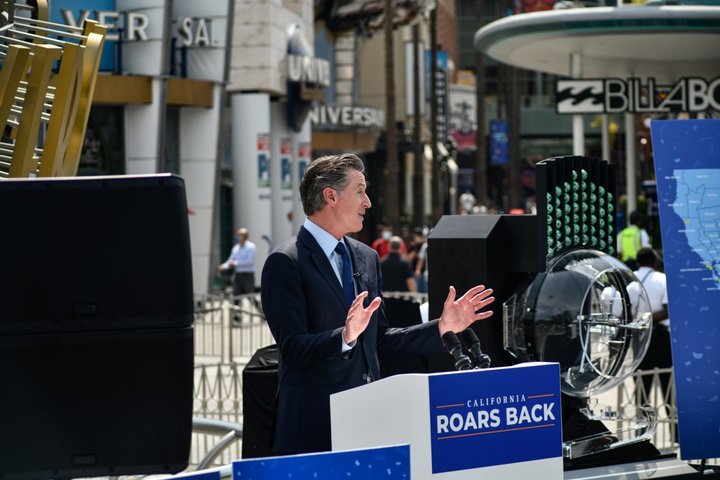
Gov. Gavin Newsom delivers a news conference at Universal Studios in Universal City, regarding California’s coronavirus-related restrictions that were lifted on Tuesday, June 15, 2021. After 15 months, California’s economy has fully reopened. Pablo Unzueta for CalMatters.
###
California voters will decide on Sept. 14 whether to throw Gov. Gavin Newsom out of office, making him the second governor in state history — and just the fourth nationwide — to face a recall.
The announcement today from Lt. Gov. Eleni Kounalakis comes after weeks of procedural wrangling by Democratic lawmakers and state officials to speed up the process for choosing a recall election date. Their apparent calculation is that the Democratic governor has better odds of defeating the GOP-backed recall if an election is held sooner rather than later.
“I believe we have chosen a fair and reasonable date for this election to take place,” Kounalakis said in a statement. “It has always been my intention to choose an election date that gives election officials and the public ample time to ensure a smooth election with broad participation.”
Newsom’s public approval has been rising as the state rebounds from the coronavirus pandemic, and he’s already amassed a hefty war chest to fight the recall. Delaying a vote until later in the fall would give his opponents more time to mobilize — and raises the possibility that voters could sour on Newsom if conditions in the state worsen due to the pandemic, wildfire season or other unforeseen calamities.
Though the recall effort — led by conservative activists critical of Newsom’s opposition to the death penalty and California’s high taxes, widespread homelessness and immigrant-friendly policies — began before the pandemic hit, it gained support as the virus surged and Newsom imposed strict lockdowns to contain it. He was widely blasted as a hypocrite when reports surfaced in November that a maskless Newsom had attended a lobbyist friend’s birthday party at the ritzy French Laundry restaurant, even as he told Californians to mask up and avoid socializing.
Only about 55,000 voters had signed recall petitions at the time of dinner. A judge gave proponents more time to collect signatures due to the pandemic. And by the deadline in April, some 1.7 million voters signed the recall petition, more than enough to trigger the recall.
But the state law governing recall elections lays out a lengthy process between gathering signatures and holding a vote. To speed things up, the Democratic-controlled Legislature on Monday passed a bill allowing lawmakers to skip a 30-day financial review of election costs if they’ve already set money aside in the budget to pay for a recall — and Newsom signed it into law within hours. The new state budget they passed includes $250 million to pay for putting on the election.
“Politicians play partisan games. It’s all about retaining power,” GOP businessman John Cox, who lost to Newsom in 2018 and is challenging him again, said during a morning campaign stop in Sacramento.
“I think people will see what’s going on. And it’ll backfire.”
The Republican Party in California has diminished dramatically since 2003, when voters threw Democratic Gov. Gray Davis out of office in a GOP-backed recall and replaced him with Republican Arnold Schwarzenegger. Voters haven’t elected a Republican for statewide office since Schwarzenegger’s reelection in 2006. And Republicans hold so few seats in the Legislature — about one-fourth — that they don’t have the power to influence policy or budget decisions.
But a recall creates an opportunity for Republicans, because the rules are different from an ordinary election.
A recall ballot contains two questions. First: Should Gavin Newsom be recalled? And second: If he is recalled, who should replace him? If more than 50% of voters say “yes” to the first question, the person who gets the most votes on the second question wins — even if they have less than a majority. That’s because there’s no limit to how many people can run in the recall.
Already, 55 people have filed a statement of intention to run, including former San Diego Mayor Kevin Faulconer, former Sacramento-area U.S. Rep. Doug Ose and reality TV personality Caitlyn Jenner — all Republicans. Conservative talk show host Larry Elder also is considering a run, Politico reported.
Not surprisingly, Republicans are very fired up about the recall, with a recent poll showing 75% are highly interested in it. But only 36% of Democrats said the same, which means Newsom’s challenge in the next two-and-a-half months will be to motivate them to vote.
###
CalMatters reporter Manuela Tobias contributed to this report. CALmatters.org is a nonprofit, nonpartisan media venture explaining California policies and politics.
CLICK TO MANAGE